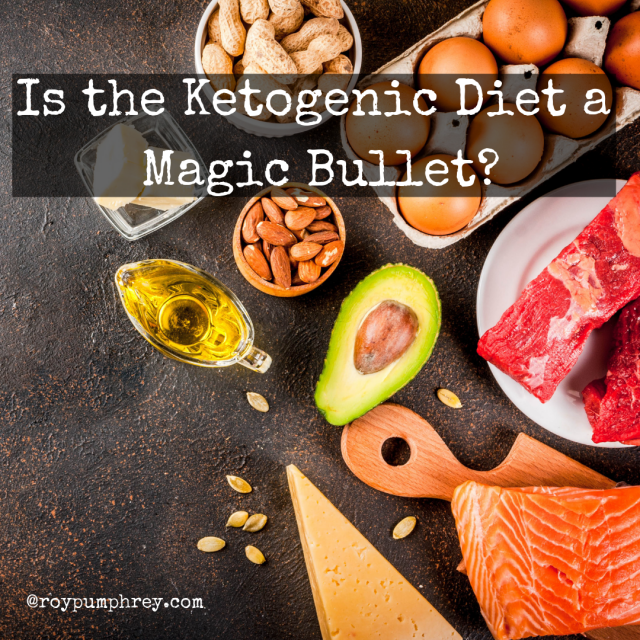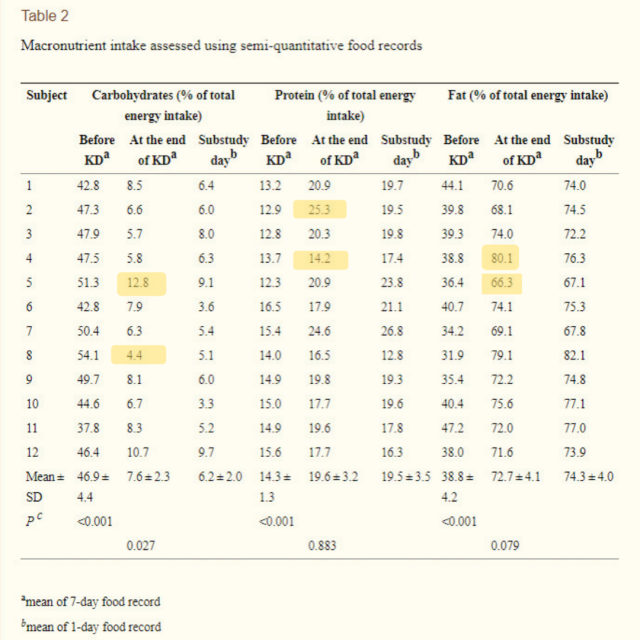 New Year, New You
New Year, New You
Dietary New Years Resolutions usually amount to,
“This is the year, I’ll finally eat like an adult, quit making excuses for my craptastic food choices, (and yes, they are CHOICES), and take actual f-ing responsibility for what I, a fully functioning adult human being, put in my mouth”.
But, let’s get real.
Linda brought doughnuts this morning.
Boston Crème…
I’ll just have one and start tomorrow. <—-find tomorrow on the calendar..
Hell, its only the end of January, your resolution has probably already been “broken” and you’re at the same place you were on February 1, 2018, and February 1, 2017 and February 1, 2010.
But maybe not, maybe this time you stopped relying on motivation and accepted the “suck” and you’re still going strong.
I’m sure you’ve heard about this new, high fat, magical diet that turns your body into a fat burning machine and has become the “It” diet of 2019.
The Ketogenic Diet
Keto is so powerful that it caused a war of words between the nutritional science heavyweights
Jillian Michaels vs. Al Roker.
Celebrities swear by it, so it must be the greatest, most effective, ground breaking diet EVER.
Right?
 Keto has Been Around for a While Now.
Keto has Been Around for a While Now.
“Fasting and other dietary regimens have been used to treat epilepsy since at least 500 BC. To mimic the metabolism of fasting, the ketogenic diet (KD) was introduced by modern physicians as a treatment for epilepsy in the 1920s.” – History of the Ketogenic Diet
“In the early 1920s, Drs. Cobb and Lennox at Harvard Medical School began studying the effects of starvation at a treatment for epilepsy. They were the first to note that seizure improvement typically occurred after 2–3 days. Lennox documented that the control of seizures occurred through a change of body metabolism and that simple absence of food or dearth of carbohydrate in the body forced the body to burn acid‐forming fat.” – History of the Keto (same as above)
There is NOTHING new about ketogenic diets.
The process of getting into Ketosis, using Ketone bodies for fuel, has been known of and described in the literature for at least 100 years.
What makes Keto different from other diets?
Keto Actually Does Stuff!
One of the things that does separate the Ketogenic diet from almost all other “fad” diets is that the ketogenic diet has an actual PHYSIOLOGICAL effect at the cellular level.
Ketogenic diets actually have a clinical application.
Keto was considered the MOST EFFECTIVE known treatment for childhood epilepsy for a LONG time.
“Throughout the 1920s and 1930s, the KD was widely used. In his 1972 textbook, Livingston, at Johns Hopkins Hospital, reported on the results of the diet in over 1,000 children with epilepsy that he had followed over the prior decades (Livingston, 1972). He suggested that 52% had complete control of the seizures and an additional 27% had improved control.“- Same article again…it’s good.
In fact, the Ketogenic diet is still a very effective treatment for childhood epilepsy and can help reduce or negate the need for anti-seizure medication in some cases,
“Of the 232 children, 43 or 18.5%, became drug-free while on the ketogenic diet and 32 or 13.8% remained off ASDs throughout the ketogenic diet,” said presenter Lochan Shah, a third-year medical student at Johns Hopkins University School of Medicine” – MD Magazine
Wait, What the Hell IS the Ketogenic Diet?
What exactly makes the diet part of the ketogenic diet different from other diets?
The body “likes” to use glucose, sugar, to fuel the body.
But it NEEDS glucose to fuel the brain.
So if you restrict carbs enough you’ll break down fat, instead of carbs for energy and produce ketone bodies to use as energy instead of glucose.
“Ketone bodies are produced by the liver and used peripherally as an energy source when glucose is not readily available. The two main ketone bodies are acetoacetate (AcAc) and 3-beta-hydroxybutyrate (3HB), while acetone is the third, and least abundant, ketone body. Ketones are always present in the blood and their levels increase during fasting and prolonged exercise.”- Ketone Bodies
This preserves the now limited glucose for brain metabolism.
“The goal of the KD is to sufficiently deprive the body of CHO to achieve physiological or “nutritional ketosis,” a metabolic state which is characterized by blood ketone levels between 0.5 and 3.0 mmol/L. This “switch over” point, however, is not seamless and may take up to several weeks for individuals to become “keto adapted”. Supporting this idea is a significant amount evidence indicating that a “keto adapted” body has little reliance on glucose for CNS function or as a source of energy for exercise.” – Dr. Carmine R Grieco
Easily put the Ketogenic Diet is,
Low Carb/ High Fat/ Minimal to Moderate Protein
Ketogenic diets are characterized by a reduction in carbohydrates (usually to less than 50 g/day) and a relative increase in the proportions of protein and fat – Beyond weight loss: a review of the therapeutic uses of very-low-carbohydrate (ketogenic) diets
“The classic Ketogenic Diet is 90% fat“– A Really good, non nerdy, Article about Keto
The “classic Ketogenic diet” is the type that was originally used in the research from the 1910’s and 1920’s at Hopkins, Harvard and the Mayo Clinic.
That 90% fat not only crowds out carbs but protein as well.
And we’ve seen protein needs to be hella lot higher than the RDA for optimal functioning.
The #1 Mistake People Make on a Ketogenic Diet
Consuming too much protein while severely restricting carbs will result in some of the amino acids being transformed into glucose effectively knocking you out of ketosis.
“the synthesis of glucose from noncarbohydrate precursors, a process called gluconeogenesis. This metabolic pathway is important because the brain depends on glucose as its primary fuel and red blood cells use only glucose as a fuel.”- Biochemistry
Too Much Glucose= No Ketosis.
But you also don’t want to lose all your #gainz from not having enough protein.
#don’tloseyourgainzzbro
The Modified/ Modern Ketogenic Diet
In the literature it’s also called the Modified Atkins Diet (MAD).
It’s the ketogenic diet, just, with some more protein.
Modified ketogenic diets have protein in the 15-25% of total daily calorie range.
BTW modified ketogenic diets, despite their higher protein intakes, are still an effective in the treatment of epilepsy.
“The Ketogenic Diet whether classic 4:1 or MAD (Modified Atkins Diet) is a tolerable, safe, and effective adjuvant therapy for intractable symptomatic childhood epilepsy with limited adverse effects” – Modified Atkins diet vs classic ketogenic formula in intractable epilepsy.
What About Gluconeogenesis?
That could be an issue on a modified ketogenic diet unless,
You’re Smashing Weights Bro.
Being physically active increases the bodies need for protein to repair and rebuild the tissues of the body.
Once the ketogenic “furnace” is burning, you’ll still run off of ketone bodies for energy while sparing the proteins for tissue repair and recovery.
If you’re not very active on a regular basis, probably best to keep the protein at 15% and below, just to make sure you stay in ketosis.
Does Low Protein Mean Keto Will Take My Gainzz?
No, I can definitively say that the Ketogenic diet will NOT steal all your gainzzz. <—-probably, like ANY intervention, there is individual variability so if you really want to know you’ll have to do that most dangerous of things called, “Try it for yourself and figuring things out.”
How do I know keto is #gainzz friendly?
Mostly, personal experience.
Now, I don’t follow a Ketogenic diet.
Long ago, I tried.
It’s awful, like torture.
But I know of several power sport and physique athletes, some of them personally, who use the Ketogenic diet with great success.
But it could be confirmation bias, so we look to the….
Evidence?
Well, there isn’t much really.
As far as I can tell, right now (January 2019) there hasn’t been much research that investigated the effect of a Ketogenic Diets effect on LBM (lean body mass) and resistance training .
What has been done, the results seems mixed.
Keto And Gainz:
“The Primary finding of this study that the KD (ketogenic diet) resulted in favorable body composition changes relative to the WD (western diet) with similar increases in muscle strength and power…..The present study was the first to investigate the effects of KD with resistance training in trained athletes…..” – Wilson, Lowry, Volek, D’Agostino and all the other low carb research super friends in one place.
“this research showed no significant changes nor effect size on LBM (lean body mass), despite hyperenergetic condition and high protein intake (2.0 g∙kg− 1⋅d− 1) in resistance-trained men of the KD (ketogenic diet) group. Thus, we conclude that low-carbohydrate dietary approaches, such as KD, would not be an optimum strategy for building muscle mass in trained men under the training conditions of this study”- Efficacy of ketogenic diet on body composition during resistance training in trained men: a randomized controlled trial
I wouldn’t go making too many recommendations on a single study either way.
But I think there is more to the story.
Why I Think the Ketogenic Diet is A-Ok for Gainzz?
Even non-exercisers on a hypocaloric ketogenic diet retain more LBM (lean body mass), without doing jack sh@t, than their low-fat diet counterparts .
Keto probably increases anabolic hormones, at least testosterone, just from being keto,
“The results from several investigations strongly suggest that dietary fat has a significant impact on T concentrations; however, the influence of different types of lipids on T is not as clear. In the present investigation, dietary fat, SFA, and MUFA were the best predictors of resting T concentrations.” – Volek (the OG of VLCD (very low carb diets) research) Kraemer and Bush
And I think the logic is solid that, if higher anabolic hormone levels would appear to have a protective effect on muscle mass in caloric restricted states, the anabolic hormone profiles would lead to muscle gain in a caloric surplus.
Beyond all of that,
I’ve Seen the Power of the Keto Firsthand.
Which is total confirmation bias, I know.
But, the ketogenic diet has been used by some bodybuilders for literally decades.
I remember reading about pro level bodybuilders using the Ketogenic diet in the early 2ooo’s.
While not necessarily the Ketogenic diet, Jeff Volek has loooonnnnngggg been researching VLCD (very low carbohydrate diets) and their effects on endurance athletes. <—-who are trying to maximize power output, which has to do with strength to weight ratios and therefore somewhat on maximizing muscle mass to body weight (fat) levels.
And the guy who is probably the best known, and most prolific, Ketogenic Diet researcher, Dr. Dominic D’Agostino, smashes weights, competed in bodybuilding and powerlifting, is still pretty jacked and does the Keto.
So it looks like, in the real world, ketogenic diets allow for gainz bro provided your training volume is high enough and you’re getting enough protein.
Just like any other diet. <—-weird how that works.
How do if I Know I’m Keto?
Truth be told, unless you’re accustomed to following a ketogenic diet and you know how it “feels”, <—-I, personally, don’t “get” this whole feeling thing. But a number of people who do follow a ketogenic diet and have tested themselves regularly for an extended period of time (years) talk about you can “feel” it. So, as such, I’m willing to defer.
YOU DONT
Those same people who claim to “feel” the Keto, admit that it took years of following the diet to develop this quality and they were repeatedly wrong about being in ketosis early on.
You’ll need to test yourself with ketone strips, you can get them on Amazon.
I don’t know good ones, from bad ones.
I’m guessing (since they’ve been around forever) they’re all kinda the same.
Do I REALLY Need to Piss On Strips?
YES
Until you’ve done Keto for a while and you know how it “feels” you NEED strips, because, in my experience, a lot of people who “go keto”, when tested, are NOT in ketosis.
Simply following the macronutrient recommendations isn’t enough because,
We’re ALL Individuals
Some people can be in ketosis with 50 grams of carbs a day max, while others can be in ketosis on almost 100.
We can see from table 2 in this study by Urbain and Bertz, the percentage of carbs, fats and proteins while still maintaining ketosis can vary.

High end:
12.8% Carbs
25% Protein
80% Fat
Low end:
4% Carbs
14% Protein
66% fat.
And they all stayed in ketosis.
So there is a lot of individual variability and to optimize your ketogenic diet, hell, just to make sure you’re actually in ketosis, you need the strips.
Just eating an avocado and putting some coconut oil in your coffee isn’t “Keto” enough.
“The exact ratio of fat, carbohydrate, and protein that is needed to achieve health benefits will vary among individuals due to their genetic makeup and body composition.”- Harvard
So in the words of that linguistic giant Ice Cube,

The Magic Of Keto:
Neurologic Diseases:
The one place the Ketogenic diet really has legs is in the treatment of a number of neurological diseases.
These include not only epilepsy, but also Alzheimer’s and possibly MS.
“Although the neurological conditions discussed in this review-epilepsy, malignant glioma and Alzheimer’s disease—have distinct disease processes, each exhibit disrupted energy metabolism, increased oxidative stress and neuro-inflammation. As each of these pathophysiologic factors can be influenced through diet manipulation, it is logical and reasonable that diet could alter the course and outcomes of these and other neurologic disorders that share common pathways. Extensive preclinical work supports the use of KDs and/or ketone bodies to thwart or ameliorate histological and biochemical changes leading to neurologic dysfunction and disease. Demonstrated and hypothesized mechanisms by which ketogenic therapies influence epilepsy, malignant glioma and Alzheimer’s disease include metabolic regulation, neurotransmission modulation, reduced oxidative stress and anti-inflammatory and genomic effects….The scientific evidence collected from clinical studies in humans to date has supported KD therapy use in adult epilepsy, adult malignant glioma and Alzheimer’s disease.” – The Expanding Role of Ketogenic Diets in Adult Neurological Disorders
Multiple Sclerosis
I couldn’t find any actual evidence that the Ketogenic diet has a positive effect on MS.
But based on the logic presented in this 2015 review arguing that point exactly, it makes sense that the Ketogeneic diet could be a beneficial intervention for MS.
“The ketogenic diet has the potential to treat the neurodegenerative component of progressive MS on the basis of the following observations obtained from in vitro and in vivo studies,
(1) Neurodegeneration is thought to underlie the pathogenesis of progressive MS.
(2) Mitochondrial dysfunction may result in reduced ATP availability. This may promote axonal atrophy, leading to degeneration. There is evidence of mitochondrial dysfunction within “normal appearing” grey matter and mitochondrial function appears to correlate with axonal survival.
(3) According to in vitro and animal studies, the ketogenic diet increases ATP production, promotes mitochondrial biogenesis, and bypasses dysfunctional steps within the mitochondrial bioenergetic process, increases antioxidant levels and reduces oxidative damage. Since an increase in ATP and overall improvement in mitochondrial functioning correlates with axonal survival, the ketogenic diet may offer a therapeutic benefit for the neurodegenerative component of MS.
These premises are largely theoretical with regard to the contextual application of the ketogenic diet in MS as there is no data currently available on the ketogenic diet from human studies on MS.- The Therapeutic Potential of the Ketogenic Diet in Treating Progressive Multiple Sclerosis
Just an FYI, there is a clinical trial in progress now: Utilization of the Ketogenic Diet in Patient With Relapsing Remitting MS
The C Word
And No, it’s Not C. U. Next. Thursday.
Cancer
Not what you want to hear from your doctor.
But, it seems that the keto can help with some variants of some cancers because of the way these particular cancer cells metabolize energy.
The Warburg Effect:
“In contrast to normal differentiated cells, which rely primarily on mitochondrial oxidative phosphorylation to generate the energy needed for cellular processes, most cancer cells instead rely on aerobic glycolysis, a phenomenon termed “the Warburg effect.” Aerobic glycolysis is an inefficient way to generate adenosine 5′-triphosphate (ATP)” – Understanding the Warburg Effect: The Metabolic Requirements of Cell Proliferation
“In tumors and other proliferating or developing cells, the rate of glucose uptake dramatically increases and lactate is produced, even in the presence of oxygen and fully functioning mitochondria.” – The Warburg Effect: How Does it Benefit Cancer Cells?
In normal people speak, the thought process is: being in ketosis essentially starves the cancer cells, effectively killing them (or at least limiting their proliferation).
But like all things cancer is VERY COMPLEX, interventions are typically not universally effective for a number of reasons, and science is really hard…
So for those reasons here’s where we’re at,
“results from preclinical studies, albeit sometimes contradictory, tend to support an anti-tumor effect rather than a pro-tumor effect of the KD for most solid cancers. However, even though pro-tumor effects are rare, they cannot be ruled out per se. Most importantly, available preclinical evidence implies that the feasibility of a KD as an adjuvant cancer therapy strongly depends on the type of tumor and its genetic alterations.
To date, evidence from randomized controlled clinical trials is lacking, but needed, to answer the question of whether an adjuvant KD would benefit specific cancer patients. Human data pertaining to KDs and cancer are mostly based on single case reports and a smattering of preliminary clinical studies with small study cohorts, heterogenous study designs, poor compliance to the diet, noncomparable regimens, or without standardized dietary guidance. Even so, results of the first clinical studies support the hypothesis of an anti-tumor effect of KDs. For example, 10 of the 24 (42%) clinical studies included in a recent review [1] provide evidence for the anti-tumor effect of KDs, whereas seven (29%) showed no effect and only one study reported a pro-tumor effect of the KD. The currently available medical literature presents strong scientific evidence for the safe application of a KD only in patients with glioblastoma. However, a clear recommendation for adjuvant use of the KD in glioblastoma patients still requires results from ongoing randomized controlled clinical trials.
In conclusion, clinical application of KDs as an adjuvant therapy for cancer patients first requires that the KD be evaluated for its anti-tumor effect for each single type/genetic subtype of cancer in a preclinical setting, as the safety and efficacy of the KD strongly depend on the tumor entity and its genotype” – Ketogenic Diet in Cancer Therapy
Read that last sentence again.
“the safety and efficacy of the KD strongly depend on the tumor and entity and its genotype”
The KD is not a cure-all for cancer that the government has known about for decades yet withheld from the public so big pharma could benefit from cancer patients .
No matter what your Facebook feed tells you….
The real situation is way more complex than that.
Keto Turns You Into A Fat Burning Machine!
Now, 3 thousand words later we get to what you came here for (sorry, not sorry).
Yes the ketogenic diet has been shown effective for weight loss.
“Compared with a low-fat diet, a low-carbohydrate diet program had better participant retention and greater weight loss.” -Keto vs Low fat in the Obese
“A ketogenic diet has been shown to provide short-term benefits in some people including weight loss.” – Diet Review: Keto for Weight Loss
“the present meta-analysis demonstrates that individuals assigned to a VLCKD achieve significantly greater long-term reductions in body weight, diastolic blood pressure and TAG, as well as greater LDL and HD increases when compared with individuals assigned to a LFD”- Keto vs Low Fat For Weight Loss
The ketogenic diet does seem to have a satiating effect for some, thereby making weight loss easier and more sustainable if you can stick to the diet.
“individuals adhering to KLCD were less hungry and had a reduced desire to eat. Although these absolute changes in appetite were small, they occurred within the context of energy restriction, which is known to increase appetite in obese people. Thus, the clinical benefit of a ketogenic diet is in preventing an increase in appetite, despite weight loss, although individuals may indeed feel slightly less hungry (or more full or satisfied). Ketosis appears to provide a plausible explanation for this suppression of appetite.” – Does the Keto Really Suppress Appetite
Keto, A New Champion?
Now, the two lines below need to be read in Michael Buffer voice for maximum effect.
And Still… The Undefeated Heavyweight Champion of the Woooorld….
Sir, IIIIIsssssaaaaacccc Neeeewwwwtonnnnn
Yes, the ketogenic diet is effective in weight loss.
But its only AS effective as every other diet that creates a caloric deficit.
“A ketogenic diet has been shown to provide short-term benefits in some people including weight loss and improvements in total cholesterol, blood sugar, and blood pressure. However, these effects after one year when compared with the effects of conventional weight loss diets are not significantly different. – Harvard
It’s not the magic of ketones.
Because,
There is No Magic.
Just the same old law of thermodynamics.
“With scant exception, all controlled interventions to date that matched protein and energy intake between KD and non-KD conditions have failed to show a fat loss advantage of the KD. A recent review by Hall states, “There has never been an inpatient controlled feeding study testing the effects of isocaloric diets with equal protein that has reported significantly increased energy expenditure or greater loss of body fat with lower carbohydrate diets.” – International society of sports nutrition position stand: diets and body composition
If you eat fewer calories than you burn you lose weight, it really is that simple.
But a diet that controls appetite, while in a caloric deficit, would be superior if you could stick to it.
Just like any other diet.
“Diet is the most important lifestyle factor for weight loss. In order to effect significant loss of weight it is necessary to create a consistent caloric deficit. This has the rather obvious side effect of leaving individuals feeling hungry and as though they are in a constant state of deprivation. Dieting is based upon this basic concept, which is the most likely reason why dieting is very likely to fail in the long-term. The ketogenic diet, while controversial and a highly polarizing subject, has demonstrated promise as an alternative dietary strategy for weight management. The KD may hold an advantage over traditional calorie-restricted diets, in that nutritional ketosis may enhance appetite control, and subsequently improve dietary adherence and long-term success.” – Low Carbohydrate Ketogenic Diet for Weight Management
Unfortunately, like every other diet out there, the ketogenic diet is no magic bullet.
No matter how passionately someone tries to convince you otherwise.
Nutrition Is Replacing Religion
While the ketogenic diet may be a good adjuvant therapy for neurological disease and some cancers because, unlike other diets, it DOES result in the body using a different metabolic fuel..
When it comes to weight loss, it’s still just a diet and, like all other diets, bound by the confines of the mechanics of metabolism.



Hey Roy. Except Isaac Newton was the father of the three laws of motion. For thermodynamics, there is some controversy but a good candidate for the father of thermodynamics is Carnot, who wrote in 1824, much later than Newton.
Truth be told, I should have looked it up…I didn’t.
That’s what you’re for 🙂
BTW: this is one of the perks of having really smart(er) people read my musings. They tend to have worthwhile things to say about them and I get to learn things too. So now, I have to go jump down this rabbit hole…thanks a lot…